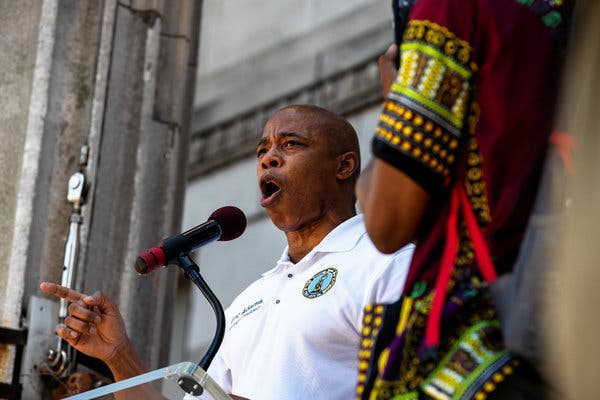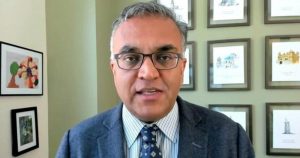Eric Adams stood on the steps of Borough Hall in Brooklyn, his office and temporary home, facing a fired-up crowd at a pivotal moment of protest against police violence toward people of color.
As the most prominent black Democratic candidate for mayor, Mr. Adams, the Brooklyn borough president, should have had a powerful connection to voters stirred by the protests surrounding the death of George Floyd in Minneapolis. And yet, at this rally on Tuesday, another black elected official threatened to eclipse him: Jumaane Williams, the city’s public advocate.
“You all ready for this?” Linda Sarsour, a prominent activist, said to the crowd of hundreds, shortly before they were to march across the Brooklyn Bridge. “When I say ‘mayor,’ you say ‘Jumaane.’”
The crowd heartily obliged.
There’s just one catch: Mr. Williams, as of now, is not running for mayor in 2021.
“I’m very happy with the job that I have, and I’m going to ask folks to give me another chance,” Mr. Williams said in an interview this week, indicating that he was focusing on re-election.
But Mr. Williams’s emergence as a sought-after candidate speaks to a surging desire among progressive activists for more options than those offered by the slate of Democratic Party candidates now before them.
“We’re trying to use every tool at our disposal to convince him that this is his moment,” Ms. Sarsour said.
Sochie Nnaemeka, the New York director of the Working Families Party, said that the protests are leading activists to cast about for alternatives to the existing field, and Mr. Williams’s name is one of several that have been floated to the party. She declined to name the others.
“Allies, W.F.P. activists, community leaders have been actively thinking about who in this moment can step up and lead, recognizing that there’s a leadership vacuum and there’s an absence of accountable leadership, especially on the issues that matter most to us — invest in our communities, divesting from the police, etc.,” Ms. Nnaemeka said.
A key moment emerged at the Brooklyn memorial service for Mr. Floyd last week, when Mr. Williams criticized the governor and mayor for prioritizing the safeguarding of property over protecting black New Yorkers.
“Where is the same energy for black lives?” he said. “Why are you not saying we have to do everything, everything, everything we can to protect black lives?”
Throughout his political career, Mr. Williams has displayed an activist streak: He has been arrested at least a half dozen times while protesting issues such as immigrant rights and President Trump’s nomination of Brett Kavanaugh to the Supreme Court.
As a New York City councilman, Mr. Williams co-sponsored legislation that helped create an inspector general for the New York Police Department. He then ran a spirited primary campaign for lieutenant governor in 2018, losing to the incumbent, Kathy Hochul, by less than seven percentage points. Months later, he won a special election to succeed Letitia James as the city’s public advocate.
Mr. Williams’s rise comes at a peculiar time in the mayoral race: For months, the city was locked down because of the coronavirus pandemic. Everyone and everything, including political campaigns, were frozen in place. New Yorkers lost access to jobs, schools, friends.
Then protests erupted, sending thousands of New Yorkers into the streets, filled with pent-up energy and a desire for change. The sometimes violent behavior of Bill de Blasio’s police force during the protests only amplified progressive disdain for the mayor, who activists say has failed to live up to his campaign promises.
Now, seven years after Mr. de Blasio ran for office on a pledge to achieve police reforms, New York City’s police force is again emerging as a central issue in a mayoral race.
Two of the leading Democratic mayoral candidates, Scott M. Stringer, the city comptroller, and Corey Johnson, the City Council speaker, began to criticize Mr. de Blasio for his heavy-handed policing strategy, one that involved officers’ using their batons on protesters and employing a herding tactic known as kettling.
Mr. Stringer has called Mr. de Blasio’s police response “a fundamental disaster” and demanded he institute sizable cuts to the Police Department budget. Mr. Johnson has been similarly pointed.
Mr. Adams has largely avoided such broadsides, instead delivering a nuanced message, rooted in a law-and-order conservatism born of his 22 years as a New York City police officer.
“No one talks about what Eric has done around these issues,” Mr. Adams said. “I’m the invisible man. Ralph Ellison said this years ago. Being a black man is invisible. But I’m on all of these radio stations, I’ve been leading this conversation, and now people are asking, ‘Well, where’s Eric?’ No, where were they?”
At night, Mr. Adams should be easy to find: He has been sleeping at his office in Brooklyn Borough Hall since the coronavirus pandemic put the city on lockdown. In recent days, Mr. Adams has livestreamed observations of vandalism, spoken about the righteous anger of protesters and has drawn distinctions between peaceful police officers and the actions of their more violent brethren.
His moderate stance may appeal to a broad electorate, but it seems less suited to the current protest environment.
“Particularly when it comes to black elected officials and the N.Y.P.D., they can’t just rest on their blackness and ask black communities to trust them,” said Anthonine Pierre, deputy director of the Brooklyn Movement Center.
At the Brooklyn memorial service for Mr. Floyd, Mr. Adams spoke after Mr. Williams; after Ms. James, now the state attorney general; after Representative Hakeem Jeffries, Democrat from Brooklyn. He even spoke after Mr. Stringer, who twice referred to George Floyd as “Greg.”
When, finally, Mr. Adams got to say his piece, he declared a kinship to victims of police violence rooted in his own personal abuse at the hands of the police.
“Before there was [Ousmane] Zongo, before there was Amadou Diallo, before there was Michael Griffith, before there was Eleanor Bumpurs, before all of that, there were two young boys in South Jamaica, Queens, 15 years old, in the 103rd Precinct, arrested for trespassing,” Mr. Adams said.
Mr. Adams recalled how officers took him and his brother into a police house and asked them if they would like a “beat down”; how the officers took them to the basement and kicked them in the groin, again and again; how he urinated blood for seven days.
Three days before the memorial service, Mr. Adams could be found at a much different event outside the 88th Precinct in Brooklyn, where he once worked. The weekend before, two lawyers had been arrested, charged with throwing a Molotov cocktail through the broken window of an empty police car, setting it on fire. Mr. Adams was there to defend the police, and to take a knee.
“We need to separate those who are violent in the protests from the righteous call of dealing with police abuse across our country, and we need to separate those officers who have displayed a high level of violence from those who are doing an amazing job very day,” Mr. Adams said. “If we don’t want to stereotype every protester, let’s not stereotype every police officer.”
The protests and the pandemic will undoubtedly continue to shake up the mayoral race. In recent weeks, two white businessmen have hinted at potential mayoral runs: Jeff Zucker, the president of CNN, suggested he might make a bid during an interview with The New York Times; John Catsimatidis, a Republican who owns the Gristedes supermarket chain, is considering a run, too.
The second tier of current candidates includes Dianne Morales, a nonprofit executive from the South Bronx; Loree K. Sutton, Mr. de Blasio’s former commissioner for veterans services and retired Army brigadier general; and Shaun Donovan, a high-ranking official in the Obama and Bloomberg administrations. (Mr. Donovan also made an appearance at the Tuesday afternoon rally at Brooklyn’s borough hall.)
None is getting the attention that Mr. Williams, a noncandidate, has received, as he livestreams protests to an avid Twitter following and contests police actions in real time.
“That’s not going to work! Why are we pushing them? Why are we pushing the protesters?” Mr. Williams can be heard asking, on a June 3 video he posted to Twitter showing police officers violently pushing protesters.
The next day, Mr. Williams spoke forcefully at the Floyd memorial in Brooklyn.
“Jumaane has stood out in the crowd,” said Ms. Nnaemeka, the Working Families Party official. “People are transfixed by him on social media, on the news and are wondering why is there a disconnect between the leadership that we want and the leadership that we have.”
Jeffery C. Mays contributed reporting.



















